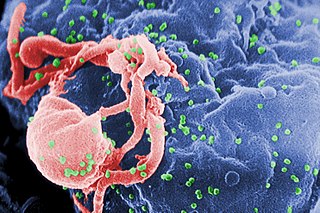
The Joint United Nations Programme on HIV and AIDS (UNAIDS) is the main advocate for accelerated, comprehensive and coordinated global action on the HIV/AIDS pandemic.
The management of HIV/AIDS normally includes the use of multiple antiretroviral drugs as a strategy to control HIV infection. There are several classes of antiretroviral agents that act on different stages of the HIV life-cycle. The use of multiple drugs that act on different viral targets is known as highly active antiretroviral therapy (HAART). HAART decreases the patient's total burden of HIV, maintains function of the immune system, and prevents opportunistic infections that often lead to death. HAART also prevents the transmission of HIV between serodiscordant same-sex and opposite-sex partners so long as the HIV-positive partner maintains an undetectable viral load.

HIV/AIDS denialism is the belief, despite conclusive evidence to the contrary, that the human immunodeficiency virus (HIV) does not cause acquired immune deficiency syndrome (AIDS). Some of its proponents reject the existence of HIV, while others accept that HIV exists but argue that it is a harmless passenger virus and not the cause of AIDS. Insofar as they acknowledge AIDS as a real disease, they attribute it to some combination of sexual behavior, recreational drugs, malnutrition, poor sanitation, haemophilia, or the effects of the medications used to treat HIV infection (antiretrovirals).

HIV/AIDS originated in Africa during early 20th century and is a major public health concern and cause of death in many African countries. AIDS rates varies significantly between countries, though the majority of cases are concentrated in Southern Africa. Although the continent is home to about 15.2 percent of the world's population, more than two-thirds of the total population infected worldwide – some 35 million people – were Africans, of whom 15 million have already died. Eastern and Southern Africa alone accounted for an estimate of 60 percent of all people living with HIV and 70 percent of all AIDS deaths in 2011. The countries of Eastern and Southern Africa are most affected, AIDS has raised death rates and lowered life expectancy among adults between the ages of 20 and 49 by about twenty years. Furthermore, the life expectancy in many parts of Africa is declining, largely as a result of the HIV/AIDS epidemic with life-expectancy in some countries reaching as low as thirty-nine years.

AIDS is caused by a human immunodeficiency virus (HIV), which originated in non-human primates in Central and West Africa. While various sub-groups of the virus acquired human infectivity at different times, the present pandemic had its origins in the emergence of one specific strain – HIV-1 subgroup M – in Léopoldville in the Belgian Congo in the 1920s.

amfAR, the Foundation for AIDS Research, known until 2005 as the American Foundation for AIDS Research, is an international nonprofit organization dedicated to the support of AIDS research, HIV prevention, treatment education, and the advocacy of AIDS-related public policy.

Human immunodeficiency virus infection and acquired immunodeficiency syndrome (HIV/AIDS) is a spectrum of conditions caused by infection with the human immunodeficiency virus (HIV), a retrovirus. Following initial infection an individual may not notice any symptoms, or may experience a brief period of influenza-like illness. Typically, this is followed by a prolonged incubation period with no symptoms. If the infection progresses, it interferes more with the immune system, increasing the risk of developing common infections such as tuberculosis, as well as other opportunistic infections, and tumors which are rare in people who have normal immune function. These late symptoms of infection are referred to as acquired immunodeficiency syndrome (AIDS). This stage is often also associated with unintended weight loss.

Flossie Wong-Staal was a Chinese-American virologist and molecular biologist. She was the first scientist to clone HIV and determine the function of its genes, which was a major step in proving that HIV is the cause of AIDS. From 1990 to 2002, she held the Florence Riford Chair in AIDS Research at the University of California, San Diego (UCSD). She was co-founder and, after retiring from UCSD, she became the chief scientific officer of Immusol, which was renamed iTherX Pharmaceuticals in 2007 when it transitioned to a drug development company focused on hepatitis C and continued as chief scientific officer.

Gao Yaojie is a Chinese gynecologist, academic, and AIDS activist in Zhengzhou, Henan province, China. Gao has been honored for her work by the United Nations and Western organizations, and had spent time under house arrest. Her split with the Chinese authority on the transmission and the seriousness of the AIDS epidemic in China hinders her further activities and resulted in her leaving for the United States in 2009. She is now living alone in uptown Manhattan, New York City.
Jackie Appiah is a Canadian-born Ghanaian actress. For her work as an actress, she has received several awards and nominations, including the awards for Best Actress in a Leading Role at the 2010 Africa Movie Academy Awards; and Best Actress in a Supporting Role at the Africa Movie Academy Awards in 2007. She received two nominations for Best Actress in a Leading Role and Best Upcoming Actress at the Africa Movie Academy Awards in 2008. Glitz Africa Honors Her with Excellence in Creative Art Award at Ghana Women of the Year Honors 2023. She is a movie producer, fashion model and a humanitarian.
The history of HIV/AIDS in Australia is distinctive, as Australian government bodies recognised and responded to the AIDS pandemic relatively swiftly, with the implementation of effective disease prevention and public health programs, such as needle and syringe programs (NSPs). As a result, despite significant numbers of at-risk group members contracting the virus in the early period following its discovery, Australia achieved and has maintained a low rate of HIV infection in comparison to the rest of the world.

Mercy Johnson Okojie is a Nigerian actress, film director and film producer She went to a Rivers State Secondary School for her secondary education in addition to the Nigerian Navy Secondary School in Port Harcourt, Rivers State. Right after her secondary education, she auditioned for a role in the movie titled The Maid and subsequently acted in other movies such as Hustlers, Baby Oku in America,and War in the Palace.

Gift Iyumame Eke, professionally known as Muma Gee, meaning "do good Gift", is a Nigerian singer-songwriter, actress, businesswoman, fashion designer, television personality and politician. She was born, raised, and resides in Port Harcourt. Uwame's first taste of stardom came through her song "Kade", which became the title track of her first official album, released in 2006. The single's accompanying music video directed by Wudi Awa, received five nominations, including two from the AMEN Awards and one each from the Nigerian Music Video Awards, the Headies Awards, and the Sound City Music Video Awards.

Deborah Leah Birx is an American physician and diplomat who served as the White House Coronavirus Response Coordinator under President Donald Trump from 2020 to 2021. Birx specializes in HIV/AIDS immunology, vaccine research, and global health. Starting in 2014, she oversaw the implementation of the President's Emergency Plan for AIDS Relief (PEPFAR) program to support HIV/AIDS treatment and prevention programs in 65 countries. From 2014-2020, Birx was the United States global AIDS coordinator for presidents Barack Obama and Donald Trump and served as the United States special representative for global health diplomacy between 2015 and 2021. Birx was part of the White House Coronavirus Task Force from February 2020 to January 2021. In March 2021, Birx joined ActivePure Technology as Chief Medical and Science Advisor.
Diminas Dagogo is a film director from Rivers State, Nigeria best known for his makeup and special effects work on Nollywood films. He has received two AMVCA nominations for his work on Stigma (2013), which starred Hilda Dokubo.
Yolanda Serrano was a Puerto Rican-American drug counselor and HIV/AIDS activist. She received the National Organization for Women's Woman of the Year Award and was featured in Ms. magazine as one of the 1988 Women of the Year in 1988.

Together is a 2010 Chinese film directed by Zhao Liang. It was filmed beside the Chinese film Love for Life, and chronicles the everyday lives of a variety of different people living in China with HIV/AIDS. The film depicts the living conditions of those living with HIV in China, as well as their own personal thoughts on their disease. Together, like the film Love for Life, was commissioned by the Ministry of Health and backed by the Chinese government. Zhao Liang has been seen as a rebel director, producing documentaries that expose the Chinese government of wrongdoing. For instance, his documentary Petition focused on mistreatment of Chinese by local authorities and government officials. Unlike his previous works, Together was made with the Chinese government and was censored, without mention of the mishandling of the HIV/AIDS epidemic in the 1990s and the cover-up by the government. Instead, the documentary focuses more on the actual lives of individuals with HIV/AIDS instead of touching on the past blood-sharing scandal in villages.
Adaeze Chidinma Oreh Commissioner of Health Rivers State is a Nigerian Family physician, Public health specialist and Universal health care advocate who is currently a Senior Medical Officer at the Department of Hospital Services in Nigeria's Federal Ministry of Health. She is a 2019 Aspen Institute New Voices Fellow.

Diane Havlir is an American physician who is a Professor of Medicine and Chief of the HIV/AIDS Division at the University of California, San Francisco. Her research considers novel therapeutic strategies to improve the lives of people with HIV and to support public health initiatives in East Africa. She was elected to the National Academy of Medicine in 2019.













